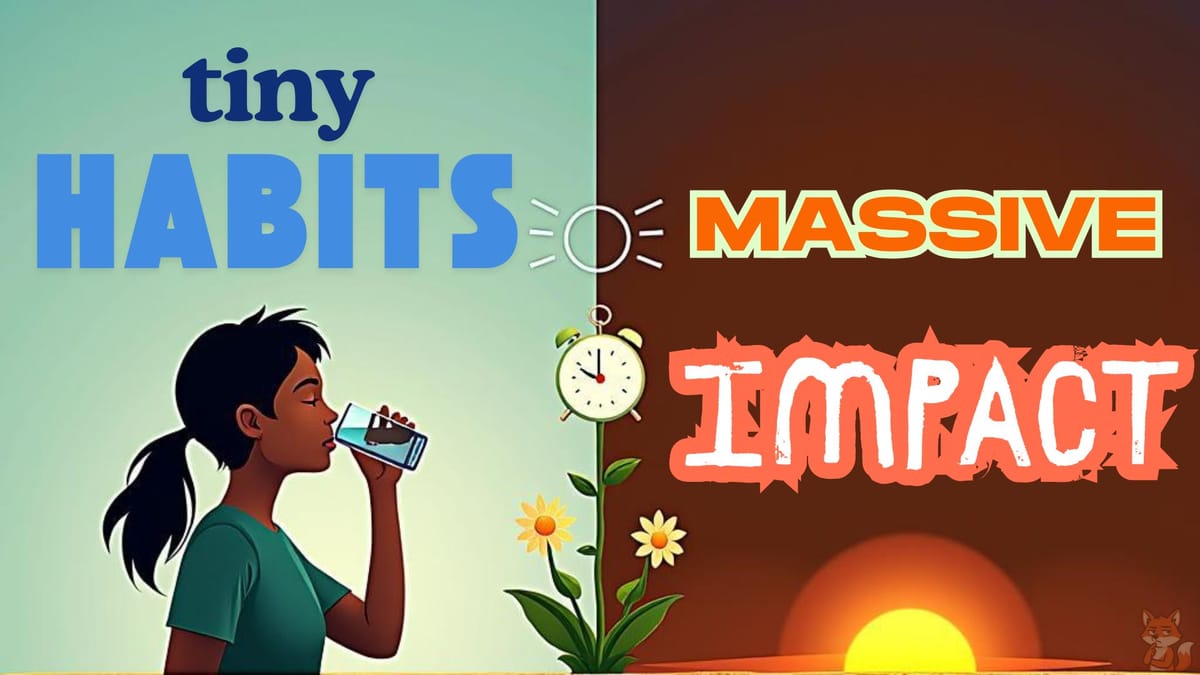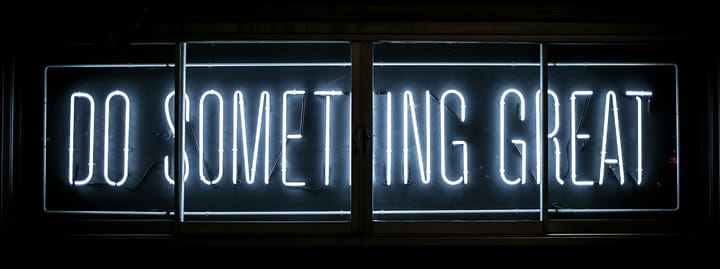Small Behaviors That Compound Into Life-Changing Results
Tired of dramatic life changes that fizzle out? These tiny daily actions compound into massive results over time - no willpower required.

Tired of dramatic life changes that last about as long as your New Year's resolutions?
You know the cycle. January 1st: "This year I'm going to completely transform my life!" January 15th: Back to old habits, feeling like a failure, wondering why you can't stick to anything.
Meanwhile, you watch other people seem to effortlessly improve their lives while you're stuck in the same patterns year after year.
Here's what they know that you don't: Big changes don't come from big efforts. They come from small efforts repeated consistently.
The most successful people aren't more disciplined or motivated than you. They just understand compound effects and work with their psychology instead of against it.
Battle-tested by someone who went from chaos to consistency using tiny changes that seemed almost too small to matter.
Why Big Changes Fail (And Small Ones Stick)
Your brain resists dramatic change. It's literally designed to keep you safe by maintaining the status quo.
Willpower is a limited resource. Trying to overhaul your entire life depletes it quickly.
All-or-nothing thinking sets you up for failure. Miss one day and you feel like you've ruined everything.
Small changes fly under your brain's resistance radar. They feel safe, so your psychology doesn't fight back.
Compound effects are invisible at first, which is why most people give up before they see results.
The secret: Start so small it feels almost silly. Then let time and consistency do the heavy lifting.
🎯 The Compound Effect in Action
Health and Energy
2-Minute Morning Movement
- Start with: 10 jumping jacks or stretches when you wake up
- Why it works: Activates your body without requiring gym motivation
- Compounds into: Natural desire to move more throughout the day
- 6 months later: Regular exercise habit that feels automatic
Glass of Water Before Coffee
- Start with: One glass of water first thing in the morning
- Why it works: Rehydrates your body after 8 hours without water
- Compounds into: Better energy, fewer afternoon crashes
- 1 year later: Naturally drinking more water all day
10pm Phone Dock
- Start with: Put phone in another room at 10pm every night
- Why it works: Removes the temptation to scroll before bed
- Compounds into: Better sleep quality and easier mornings
- 6 months later: Natural bedtime routine without technology
Mental Clarity and Focus
3 Deep Breaths Before Checking Email
- Start with: Three slow breaths before opening your inbox
- Why it works: Centers your mind before reactive tasks
- Compounds into: More intentional responses, less stress
- 3 months later: Naturally pausing before reacting to anything
One Page of Reading Before Social Media
- Start with: Read one page of a book before opening any social apps
- Why it works: Primes your brain for deeper thinking
- Compounds into: Preference for books over scrolling
- 1 year later: Reading 20+ books annually without effort
Single-Task 25-Minute Blocks
- Start with: Do one thing for 25 minutes without switching
- Why it works: Trains focus muscles gradually
- Compounds into: Deep work becomes natural and enjoyable
- 6 months later: Ability to focus for hours when needed
Relationships and Communication
One Genuine Compliment Daily
- Start with: Give one specific, honest compliment each day
- Why it works: Trains your brain to notice positive things
- Compounds into: Better relationships, more positive mindset
- 1 year later: Reputation as someone who lifts others up
5-Minute Daily Check-ins
- Start with: Ask "How was your day?" and actually listen
- Why it works: Small consistent connection beats grand gestures
- Compounds into: Deeper relationships, better communication
- 2 years later: Strong network of people who trust and support you
Text Response Within 2 Hours
- Start with: Acknowledge messages within 2 hours (even if brief)
- Why it works: Shows respect for others' time and attention
- Compounds into: Reputation for reliability and consideration
- 1 year later: People prioritize your messages because you prioritize theirs
Learning and Growth
5 Minutes of Skill Practice
- Start with: Practice anything for just 5 minutes daily
- Why it works: Too small to procrastinate, too short to burn out
- Compounds into: Genuine enjoyment and natural session extension
- 2 years later: Advanced skills that others think came from "talent"
One New Thing Learned
- Start with: Learn one small fact or skill daily
- Why it works: Keeps your mind curious and growing
- Compounds into: Natural learning mindset and broad knowledge
- 5 years later: Renaissance person with diverse expertise
Weekly 30-Minute Reviews
- Start with: Spend 30 minutes every Sunday reviewing the week
- Why it works: Reflection turns experience into wisdom
- Compounds into: Self-awareness and continuous improvement
- 1 year later: Clear understanding of what works and what doesn't
🔧 The Implementation Strategy
Week 1: Pick ONE Behavior
- Choose something that takes under 2 minutes
- Link it to an existing habit (after I brush my teeth, I will...)
- Track it simply (checkmark on calendar)
- Celebrate small wins (feel good about doing it)
Week 2-4: Make It Automatic
- Do it every single day (consistency beats perfection)
- Don't add anything new (resist the urge to pile on)
- Notice how it feels (track energy, mood, other effects)
- Adjust if needed (but don't abandon)
Month 2: Add ONE More
- Only after the first behavior feels automatic
- Choose something complementary (builds on the first habit)
- Keep tracking both (but don't overcomplicate)
- Stay patient (compound effects take time)
Month 3-6: Trust the Process
- Resist the urge to add more (two habits are enough for now)
- Notice gradual changes (energy, mood, capabilities)
- Document progress (photo, journal, metrics)
- Plan your next addition (but don't implement yet)
🚫 Compound Effect Killers
Starting with too many behaviors at once
Your brain can only automate one new habit at a time
Choosing behaviors that are too big
"Exercise for an hour" is too big; "put on workout clothes" is perfect
Skipping tracking completely
What gets measured gets done
Expecting immediate results
Compound effects are invisible for the first 2-3 months
Adding complexity too quickly
Keep it simple until it's automatic
Comparing your beginning to someone else's middle
Focus on your own progress
📊 Real Examples of Compound Success
Case Study 1: The 2-Minute Reader
- Started with: Reading one page before coffee
- Month 3: Naturally reading 10-15 pages
- Year 1: Reading 30+ books annually
- Result: Career advancement from increased knowledge
Case Study 2: The Daily Walker
- Started with: Walking to the mailbox daily
- Month 2: Walking around the block
- Year 1: Walking 3+ miles daily
- Result: 40-pound weight loss, better energy, new friend group
Case Study 3: The Mindful Responder
- Started with: Three breaths before checking email
- Month 2: Pausing before all responses
- Year 1: Known for thoughtful communication
- Result: Promotion to management role
The Science Behind Why This Works
Neuroplasticity
Your brain literally rewires itself based on repeated behaviors. Small, consistent actions create stronger neural pathways than sporadic intense efforts.
Identity-Based Change
Each small action is a vote for the type of person you want to become. "I'm the type of person who reads daily" is more powerful than "I want to read more."
Keystone Habits
Some small behaviors trigger positive changes in other areas. Morning exercise often leads to better eating, improved sleep, and increased productivity.
Reduced Decision Fatigue
Automated behaviors free up mental energy for important decisions instead of constantly choosing whether to do healthy things.
Choosing Your First Compound Behavior
Ask yourself:
- What small change would improve my energy?
- What tiny habit would make my mornings better?
- What 2-minute action would compound into something significant?
- What existing habit can I link a new behavior to?
Good starter behaviors:
- Health: Drink water when you wake up
- Productivity: Make your bed every morning
- Learning: Read one paragraph during coffee
- Relationships: Send one appreciation text daily
- Mindfulness: Take three deep breaths before starting your car
Red flags (too big for starting):
- Exercise for 30 minutes
- Read for an hour
- Meditate for 20 minutes
- Meal prep every Sunday
- Journal three pages
The Long Game
Month 1: Feels almost pointless (this is normal)
Month 3: Starting to feel natural
Month 6: Noticeable improvements in related areas
Year 1: Significant compound effects become visible
Year 2: People ask how you changed so much
Year 5: The person you wanted to become
The magic: After 2-3 months, the behavior feels weird NOT to do. That's when you know it's truly compound-ready.
Remember: You're not trying to change everything at once. You're building a system of small behaviors that naturally lead to the life you want.
Ready to start your compound journey? Pick one tiny behavior from this post and commit to it for 30 days. Get in touch with what you choose - I love tracking these transformations.
Want more habit-building strategies? Check out our focus techniques that actually work or explore productivity systems that stick.

